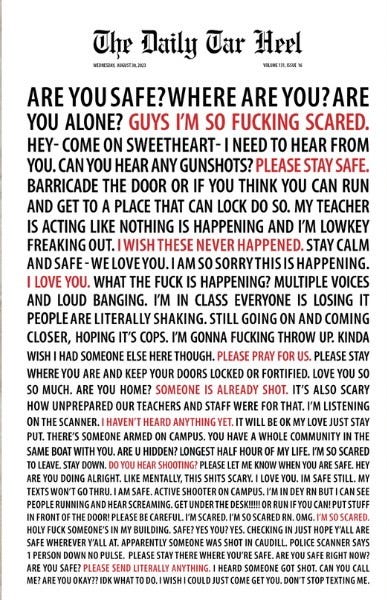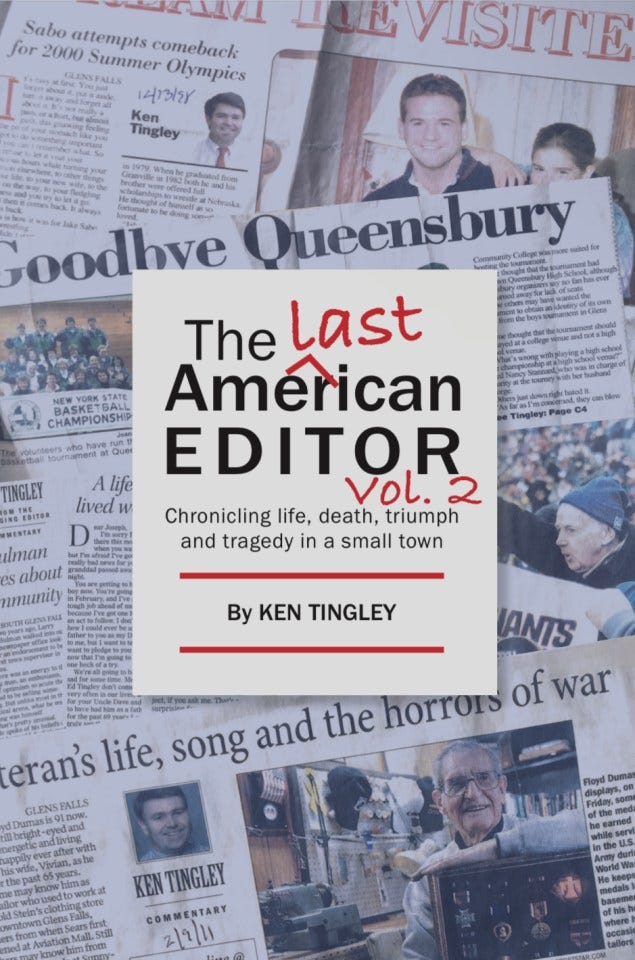If you listen to politicians, end times are just around the corner
One college teacher finds students no less than ever about the world
By Ken Tingley
My life is pretty good.
I’m not bragging, just making an observation. I’ve retired, continue to write and do the things I want to do.
I’m not rich, but I’m comfortable and don’t have to worry about paying the bills.
I live in a great region where I don’t fear hurricanes, tornadoes, floods and over the past few years, the winters have been milder than what I remember. The snowblower is there if I need it, but I haven’t had to use it as much as in the past.
So when I hear what politicians are saying about the country, sometimes the state and region, I’m not sure what to think anymore.
One politician says there is an “invasion” happening at the southern border, although none of the invaders are armed and many are women and children.
Another says crime is running rampant in the state, yet Glens Falls and the surrounding times seem to be as safe as ever.
Presidential candidates are saying we need to produce more oil and gas to bring down prices when the United States is already the leading energy producer in the world.
There seems to be more interest in electric cars - the charging stations in use more and more - and solar panels and I don’t hear many people debating climate change anymore.
Granted, Covid-19 delivered a blow to our psyche and economy we are still recovering from, but the vaccines have worked for me and my wife and prices at the supermarket are coming down slowly.
Some are saying the economy is in shambles when the statistics show we are are gradually recovering and doing far better than other places in the world.
Other politicians are saying we have to change how history is taught - especially about slavery - while others are suggesting we should ban books. Reading “Catcher in the Rye” was a defining moment in my adolescence.
If you listen to any of the presidential candidates, you would think the end times are just around the corner.
That has not been my experience.
There are challenges for sure, but I’d like to think things are getting better, not worse.
But I guess that’s how politicians win elections. They have to scare the voters to win their support.
And that’s a shame.
Chapman board
I joined the board of directors at the Chapman Museum this week. I have always had a passion for history and previously served on the board at Grant Cottage. So, in the interest of full disclosure, you may be seeing a few more stories about the Chapman, its events and its future, not only because I am on the board, but Glens Falls and the surrounding region also has some great history to tell.
I’m looking forward to the experience.
Oh my!
Rosemary Armao , the former journalist and panelist on WAMC’s Roundtable, also teaches a journalism class at SUNY Albany. I was a guest speaker in her class at RPI last year.
She posted this on Facebook Thursday:
“Gotta love students who don’t have a clue about current events they are getting quizzed on — but give it a good try anyway. This week I asked two questions: “How did Yevgeny Prigozhin die?” And “Who was Yevgeny Prigozhin?” And my students suggested he was: the prime minister of Istanbul, a famous scientist, a Brazilian politician, “maybe an artist,” the host of the Price is Right, a news reporter, an activist and “somebody probably really important” who died of covid, a heart attack, a car accident, cancer or “lack of communication.” It is going to be a very long semester.
Like I said, most of these students are science and engineering geeks, so maybe that isn’t surprising, but I loved one of the comments from one of Rosemary’s followers. It really explains the value of newspapers and what we are losing.
“Ask their parents who Prigozhin was and how he died. 25 years ago, in a different city, early in the morning there was a newspaper in almost every driveway in my neighborhood. In my neighborhood here there are very few. Nationwide, newspaper readership is in steep decline. A sad commentary on this country.”
It’s what happens when we lose our local newspapers.
EDITOR’S NOTE: I originally posted that the class was at RPI when it was a journalism class at SUNY Albany.
Campus fear
The Daily Tar Heel captured the fear of students on its campus after an incident with an an active shooter on campus this week. Reporters and editors reached out to fellow students and asked them to share their texts they sent after they heard about the shooting.
They compiled the texts into a haunting front page.
This was not something I had to worry about when I was in college in the 1970s.
Book trailer
If you haven’t had a chance to check out the trailer for “The Last American Editor, Vol. 2” I urge you to take a look and preorder. It might be also be a reminder of the valuable stories that newspapers tell.







Things ARE getting better. But things don’t get better by accident, and too often we are ‘fixing’ problems the expensive way - when we are already deep in them and nobody can deny their existence. Foresight, planning, and well conceived action long before everyone concedes that what was once a problem on the horizon becomes a crisis of the moment is nice once in a while. Richard Nixon empowered a panel to study atmospheric warming. Jimmy Carter instituted economy standards for autos and tried to encourage green energy. Back when Mao was Chairman in China the USA could have been driving a worldwide clean energy future. We could have enriched ourselves while supplying clean power and technology to the world and massively improving lives of people in poor countries. Imagine if we had developed our economy in a way that enriched itself on 3rd World countries not at their expense, not by encouraging them to plunder their natural resources, not by selling them guns and bullets, but by helping them leapfrog past economies based on Mass Consumption and build clean, resilient communities able to sustain themselves and their traditions. We would very likely not have massive numbers of desperate people crowding our southern border, dying in deserts, drowning in the Mediterranean, using every last resource their families can muster to pay for escape only to die far from family and home, selling their kidneys and even their children to buy food for their families.
Instead people of vision are painted as alarmist nuts. Go ahead, tell me another Al Gore joke.
We tend to think that the way our system works is simply a natural thing, it just exists, but it isn’t. We are a Mass Consumer society because Mass Consumption has been basic US policy since not long after WW2 and it was used as a weapon of the Cold War. I’m not crating conspiracy theories here, I’m relating history. When you go to the store to buy a bigger TV, or a 2nd or 5th TV; when you buy a gas guzzling truck; when you buy or build a bigger house than you need and then you have to fill it with furniture, heat it, cool it, pay the taxes on it…, when you have some irrational desire to buy some stuff that you really do not need - that you know deep in your heart that you do not need - you are under the spell of economic theories and models developed when you were a child or long before you were born. I’m not making this up - see attached links. These ideas were misguided at the time and not sufficiently corrected since first becoming core economic policy.
So, yeah, our economy is very strong, we are (as a whole) rich in stuff. Our economy has been powerful enough to stem many of the problems Mass Consumption has created here and around the world. But there is a tipping point. We hover at it. Perhaps people will think I’m alarmist for saying so. Or, maybe they will read the attached links and do some research on their own. Maybe. Probably not.
https://www.theguardian.com/global-development/2012/oct/08/us-economist-walt-rostow-development
https://en.wikipedia.org/wiki/Walt_Rostow
Right on, Ken. As a pastoral theologian for more than sixty years, the politicians and others you describe I have come to refer to as “apocalyptic hopers”—they believe that the worse things get the better they are. Pessimism and negativism get us nowhere. We need to be realistic, to be sure, but misinformation and disinformation need to be recognized and confronted. Where love and justice prevail there is cause for authentic hope. (Justice, for me, is the public face of compassion).